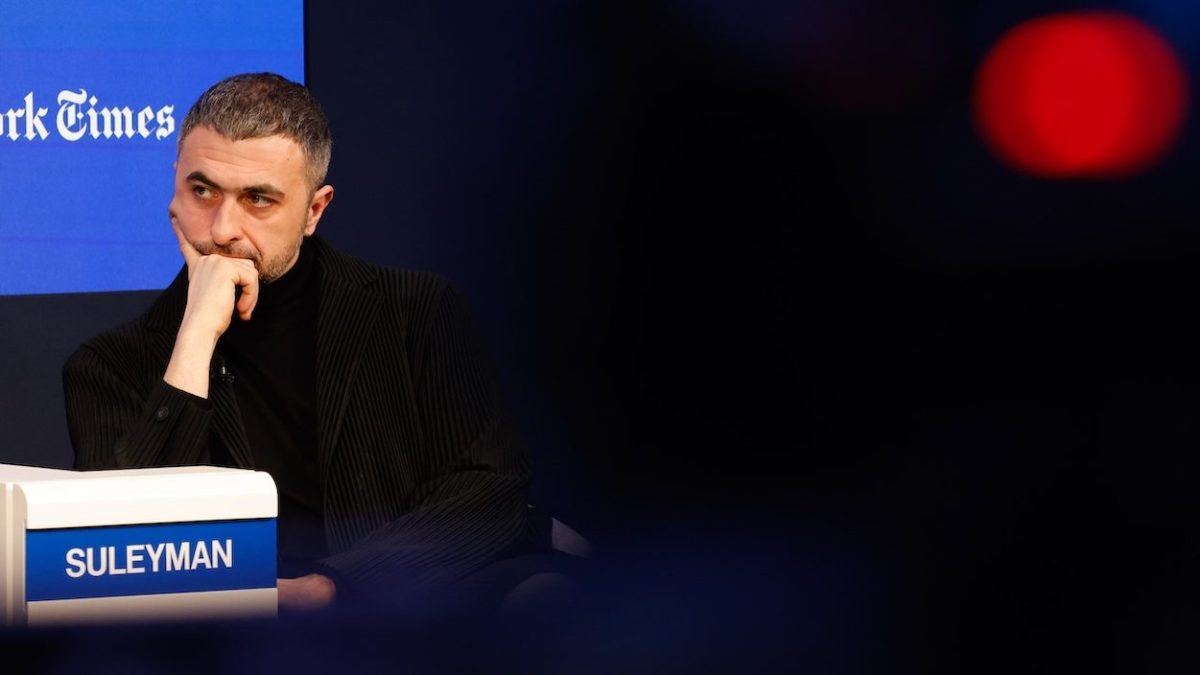Good news for Microsoft: The U.K.’s antitrust regulator says that the tech titan’s high-profile acquihire of the team behind AI startup Inflection doesn’t cause competition concerns, and thus it won’t be pursuing a full-scale investigation.
However, the Competition and Markets Authority (CMA) says that the deal does fall under its regulatory purview as a “relevant merger situation,” meaning similar deals in the future may still be investigated on competition grounds — even if a full acquisition has not taken place.
The ‘quasi-merger’
Microsoft launched a new consumer AI division back in March, spearheaded by the founders of Inflection which included Google DeepMind co-founder Mustafa Suleyman. CEO Satya Nadella confirmed that a number of other Inflection AI members had joined Microsoft’s new AI unit, such as AI scientist Jordan Hoffmann who is now heading up Microsoft’s U.K. AI hub in London.
Back in July, CMA revealed that it was launching a “phase 1” merger inquiry into the deal, kickstarting an investigation to gather evidence and decide whether to proceed with a full probe. Central to the initial phase was whether the deal could in fact be investigated as a “merger,” given that Microsoft hadn’t actually acquired Inflection AI. And if it did qualify as a merger, whether further action is required to counter competition concerns.
At the heart of all this is a growing push by big tech companies to circumvent regulatory scrutiny around AI, powered by a new M&A approach some have dubbed the “quasi-merger” — this could involve anything from strategic investments, to — as we’ve seen with Microsoft and Inflection — hiring startup founders and technical talent.
In its findings, the CMA notes that Microsoft hired “almost all of Inflection’s team” including two of its founders, while simultaneously entering into a series of commercial agreements such as a non-exclusive licensing deal to use Inflection’s intellectual property (IP).
Moreover, the CMA concluded that prior to their hiring, the Inflection team’s self-proclaimed remit was “creating AI for everyone,” but with the lion’s share of the team leaving Inflection, Microsoft had “acquired the team’s collective know-how” to develop its own AI smarts. The CMA writes in its assessment:
“Given that any technology in this space can quickly become obsolete without ongoing development, the CMA
notes the importance of expertise to the development and supply of FMs [foundation models] and chatbots. Based on the evidence seen by the CMA, the team of staff responsible for development is therefore at the core of any business seeking to develop FMs or chatbots. In this context, the CMA considers that acquiring a team with relevant know-how – even without further assets – may fall within the CMA’s merger control jurisdiction.”
One of the core criteria used in this judgement stems from the U.K.’s Enterprise Act 2002, which helps define what a “relevant merger situation” actually means. This includes whether, as a result of a transaction, “two or more enterprises cease to be distinct.”
Although Inflection still exists as a standalone business, the heart of the company is now at Microsoft.
“The transfer of employees, coupled with other tactical arrangements, mean that two enterprises are no longer distinct,” Joel Bamford, the CMA’s executive director, wrote in a LinkedIn post today.
Despite all this, the second facet of the CMA investigation concluded that the transaction didn’t pose any significant competition concerns, owing to the fact that Inflection was not a significant enough competitor to Microsoft’s existing AI tools.
“Inflection AI is not a strong competitor to the consumer chatbots that Microsoft has developed directly (Copilot) and in partnership with OpenAI (ChatGPT),” Bamford wrote. “On this basis, we cleared the transaction.”
Regulatory oversight
The original Microsoft-Inflection probe constituted one of several similar enquiries announced by the CMA back in April. This included Microsoft’s investment in French startup Mistral AI, with the regulator swiftly concluding that the deal didn’t qualify for investigation under current merger regulations due to the size of the investment. At the same time, the CMA revealed it was looking at Amazon’s ties with Anthropic in the wake of its $4 billion investment into the AI startup — this is now the subject of a formal probe.
Elsewhere, the CMA is also inviting interested parties and stakeholders to comment on Google’s ties with Anthropic, after the internet giant invested a reported $300 million last year followed by a further $2 billion.
So the main takeaway from all this is that Microsoft may have escaped regulatory intervention on this occasion, but future deals involving big tech and smaller startups are very much on the CMA’s radar — regardless of whether a full acquisition has taken place or not.
#regulator #greenlights #Microsofts #Inflection #acquihire #designates #merger
